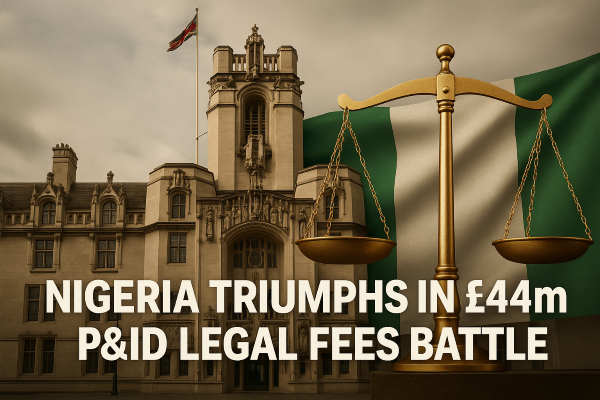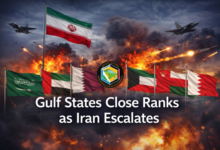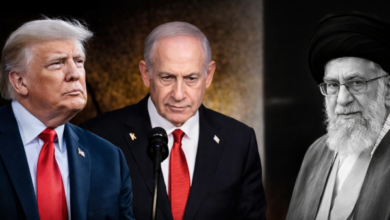
In yet another resounding legal victory that underscores Nigeria’s growing assertiveness in international litigation, the UK Supreme Court has unanimously upheld a ruling compelling Process & Industrial Developments Limited (P&ID) to pay Nigeria up to £44 million in legal costs — in pounds sterling, not naira — marking a major milestone in the country’s decade-long fight against one of the most audacious arbitration frauds in global history.
The ruling, delivered in London during the Michaelmas Term ([2025] UKSC 36), definitively rejected P&ID’s appeal against the Commercial Court’s 2023 judgment, which had set aside the company’s $11 billion arbitral award after a damning finding of fraud, bribery, and gross abuse of process.
The Backstory: A Billion-Dollar Arbitration Built on Fraud
The P&ID saga began in 2010 with what appeared to be a simple gas processing contract between the Nigerian government and the offshore shell company. In 2015 and 2017, arbitration panels in London awarded $6.6 billion plus 7% interest to P&ID — a figure that ballooned to more than $11 billion by the time Nigeria successfully challenged the award in 2023.
In a historic decision, Justice Robin Knowles of the UK High Court ruled that the arbitral process had been “tainted by fraud and corruption from inception,” revealing how P&ID’s representatives bribed Nigerian officials, concealed evidence, and manipulated arbitral proceedings to secure an astronomical payout.
The judgment not only saved Nigeria from financial catastrophe but also exposed systemic vulnerabilities in the global arbitration system — vulnerabilities that allow corrupt actors to exploit confidentiality and procedural opacity to perpetrate multi-billion-dollar frauds.
Nigeria’s Counteroffensive: The Legal Battle for Justice
The legal fallout from the P&ID scandal has been intense and far-reaching. Following its victory in having the fraudulent awards set aside, Nigeria sought to recover its extensive legal costs incurred during the lengthy proceedings — costs totalling £44.2 million, billed and paid in sterling across 116 invoices between 2019 and 2024.
P&ID, in a last-ditch attempt to limit its exposure, argued that the costs should be paid in Nigerian naira rather than pounds, claiming that a sterling-based order would unfairly enrich Nigeria due to the naira’s steep depreciation since 2019.
The company contended that Nigeria would enjoy a “windfall” if compensated in pounds sterling, as the same amount now translates to roughly ₦95 billion, compared to about ₦25 billion when payments were originally made.
However, both the High Court and Court of Appeal rejected P&ID’s arguments — and the Supreme Court has now brought the matter to a decisive close.
The Supreme Court’s Verdict: No Shelter for Fraudulent Litigants
Delivering judgment at the UK Supreme Court, Lord Hodge and Lady Simler, with the concurrence of Lords Reed, Stephens, and Richards, reaffirmed that the court has full discretion over the currency in which costs are awarded.
Their Lordships ruled that since Nigeria had incurred and paid all legal fees in sterling, it was entirely appropriate for P&ID to reimburse those costs in the same currency.
“An order for costs is not intended to compensate for loss like damages in contract or tort,” the judgment stated. “It is a discretionary, statutory indemnity against liabilities actually incurred — in this case, denominated and paid in sterling.”
The UK Supreme Court further rejected P&ID’s reliance on previous foreign-currency precedents such as Miliangos v George Frank (Textiles) Ltd and Cathay Pacific v Lufthansa Technik, noting that those cases involved damages and contractual losses, not court-awarded costs.
In a stinging rebuke, the Supreme Court emphasised that litigation costs are not subject to currency speculation and that courts must avoid disproportionate inquiries into a party’s funding arrangements — a stance that prevents “satellite litigation” over exchange rates or speculative gains.
“If a party were to use a foreign currency purely to speculate on appreciation, the court could still award costs in sterling,” the judges warned, affirming that legal certainty requires uniformity in cost awards.
A Legal and Moral Victory for Nigeria
For Nigeria, the ruling represents not just a financial win but a moral vindication in a case that has tested the country’s resilience and international credibility.
At the centre of the scandal were revelations that P&ID’s London-based lawyers — including Trevor Burke KC and Seamus Andrews — had retained privileged Nigerian government documents during the arbitration process, despite knowing they were confidential. Justice Knowles had described their conduct as an “indefensible decision,” highlighting that they stood to personally benefit from success fees of up to £3 billion and £850 million respectively.
In the aftermath of the 2023 ruling, the judge referred both men to the Bar Standards Board and the Solicitors Regulation Authority for potential disciplinary action — yet, two years on, no regulatory outcome has been announced.
Legal observers argue that the UK regulators’ inaction sends the wrong message about accountability in cross-border legal ethics. Nigeria’s Attorney General’s office has reportedly continued to press for a review of the lawyers’ conduct.
Currency, Costs, and the Bigger Picture
Beyond the specifics of this case, the UK Supreme Court judgment provides crucial legal clarity on how UK courts handle cost awards involving foreign sovereigns and cross-currency transactions in international arbitration disputes.
It reinforces the principle that the currency of payment — not the nationality of the party — determines the denomination of costs, ensuring predictability and fairness in global commercial litigation.
The Court also underscored that litigation in English courts is an inherently sterling-based process, where legal professionals bill, assess, and transact in pounds. This creates a practical framework for cost orders and safeguards against currency manipulation or speculative conversion.
In essence, the ruling consolidates London’s reputation as a predictable, rules-based jurisdiction — particularly relevant as the city continues to compete with emerging arbitration centres in Singapore, Dubai, and Paris for international disputes.
Implications for Nigeria and International Arbitration
Nigeria’s triumph in the P&ID case is widely regarded as one of the most significant anti-corruption victories in global arbitration history. It not only saved the country from potential economic ruin but also set a new benchmark for how developing nations can challenge fraudulent awards obtained under opaque arbitral systems.
Legal analysts at BRANDECONOMY note that the case also highlights the urgent need for governance reforms in contract negotiation, legal oversight, and arbitration engagement across African states.
“This judgment is more than a cost ruling,” says a Lagos-based arbitration lawyer. “It’s a reaffirmation that nations like Nigeria can hold their ground against private entities and legal cartels seeking to exploit weak institutions through international arbitration.”
For policymakers, the ruling signals a turning point — strengthening the government’s hand in renegotiating arbitration clauses, tightening contract review protocols, and building local capacity in international dispute resolution.
It also exposes the delicate balance between arbitration confidentiality and public accountability, particularly in cases involving state assets and public funds.
Restoring Confidence and Setting Precedent
The P&ID judgment has far-reaching implications for future sovereign disputes. It demonstrates that arbitration awards procured through fraud and corruption are not untouchable, and that courts — even at the highest level — are willing to revisit outcomes when justice and integrity demand it.
The outcome also boosts investor confidence in Nigeria’s legal posture. It affirms the government’s willingness to pursue accountability and to defend public interests even at enormous cost.
As Nigeria continues to strengthen its legal frameworks under President Bola Tinubu’s administration, the victory offers a blueprint for assertive legal diplomacy, judicial integrity, and economic sovereignty in the face of global commercial pressures.
Conclusion: The Cost of Justice, Paid in Full
In the final analysis, the Supreme Court’s ruling is not merely about currency denomination — it’s about justice, deterrence, and the sanctity of law.
By affirming Nigeria’s right to recover its £44 million legal fees in sterling, the UK’s apex court has sent a strong message: fraudulent actors cannot weaponize arbitration to blackmail nations, and the costs of deceit will be paid — in full, and in hard currency.
As the dust settles, attention now turns to whether the implicated lawyers and intermediaries will face the professional consequences that justice demands. For now, Nigeria’s legal team can savour a defining moment in the country’s ongoing quest to reclaim integrity, both at home and on the world stage.











